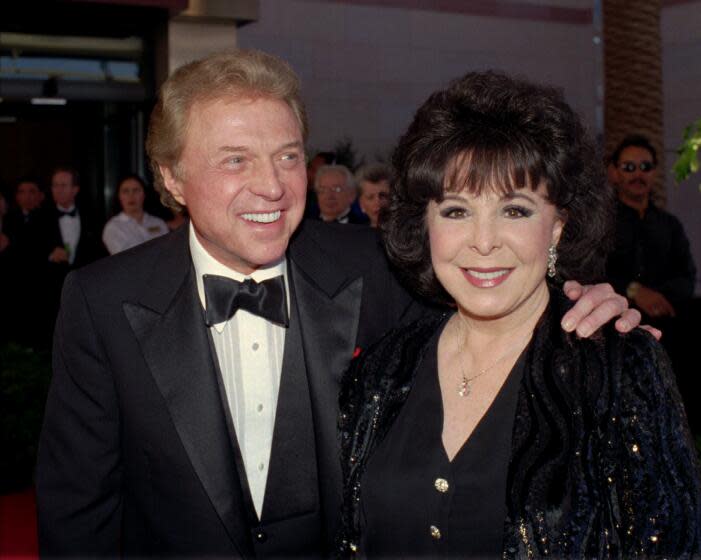Steve Lawrence, half of the Emmy- and Grammy-winning music duo Steve & Eydie, dies at 88

- Oops!Something went wrong.Please try again later.
- Oops!Something went wrong.Please try again later.
Steve Lawrence, a Grammy-winning singer and half of the pop duo Steve & Eydie, has died.
Lawrence died Thursday of complications due to Alzheimer's disease, a publicist confirmed in a statement shared with The Times. He was 88.
"My Dad was an inspiration to so many people. But, to me, he was just this charming, handsome, hysterically funny guy who sang a lot," son David Lawrence said in a statement. "Sometimes alone and sometimes with his insanely talented wife. I am so lucky to have had him as a father and so proud to be his son. My hope is that his contributions to the entertainment industry will be remembered for many years to come."
Lawrence was born in Brooklyn and started his career at a young age, winning Arthur Godfrey’s Talent Scouts competition at 16. A year later, he met future wife and singer Eydie Gormé at the famed Brill Building in New York — sparking a decades-long romance that blossomed into the musical duo known as Stevie & Eydie.
Read more: Steve Lawrence brings lifetime of experience to new album
"She had her hair in a ponytail and her ponytail hit me in my face," Lawrence recalled to The Times in 2014.
Before Steve & Eydie became known for hits including "We Got Us" and "This Could Be the Start of Something Big," Lawrence and Gormé became friends while performing on "The Tonight Show," hosted by Steve Allen in 1953. They married in 1957 and continued making music together well into the late '70s.
In 1960, Steve & Eydie earned a Grammy for their first album, "We Got Us," which featured a swinging jazz number celebrating their unbreakable love.
One of the country's best-loved singing duos, Steve & Eydie also won several Emmy Awards for starring in televised tributes to the Gershwins, Cole Porter and Irving Berlin. The couple sold out Carnegie Hall for a series of concerts in the 1980s and toured with Frank Sinatra in the 1990s.
Read more: Eydie Gorme dies at 84; pop singer did 'Blame It on the Bossa Nova'
Beyond Steve & Eydie, Lawrence also pursued an impressive solo career that included his music, Broadway and TV appearances. He received a Tony nomination recognizing his performance as Sammy Glick in "What Makes Sammy Run?" from 1964 to 1965.
Years later, Steve & Eydie took center stage as its singers starred in a Broadway production of "Golden Rainbow."
Lawrence's television career included a regular guest spot on "The Carol Burnett Show" and roles on series including "The Nanny," "Hot in Cleveland" and "Two and a Half Men." He reunited with friends Carl Reiner, Tim Conway and Garry Marshall for the latter.
He also showed his comedy chops as agent Maury Sline in 1980's "The Blues Brothers" and 1998's "Blues Brothers 2000."
In 2014, Lawrence released his album, "When You Come Back to Me Again," dedicated to Gormé, who died Aug. 10, 2013, at age 84. He told The Times that his wife heard the album before her death and "thought it was terrific."
He released "When You Come Back to Me Again" on Valentine's Day.
"We were attached at the hip — Steve-and-Eydie," Lawrence said in 2014. “It was like we were one person — to be married that long.”
Lawrence is survived by his son David; daughter-in-law Faye; granddaughter Mabel; brother Bernie; and nieces and nephews. His son Michael died in 1986.
A private funeral will take place at a later date, but donations on Lawrence's behalf can be made to the charity Alzheimer's Los Angeles.
Deputy entertainment and arts editor Nate Jackson contributed to this report.
This story originally appeared in Los Angeles Times.

